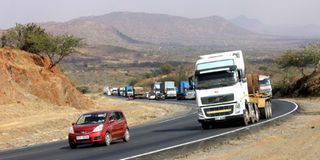Weighty questions linger over the expressway financing deal

Vehicles scaling Mlima Kiu along Mombasa Road. FILE PHOTO | NATION MEDIA GROUP
What you need to know:
I don’t take them seriously when they say that they are offering us the so-called ‘G-to-G’ model.
The entities being touted, such as OPIC and Exim Bank, are private business that don’t draw money from the US government.
The US taxpayer is not in the business of building large infrastructure projects in Africa.
Are we, really, asking the right questions about the multi-billion-shilling Mombasa-Nairobi expressway that Betchel International Inc. of Francisco, USA, wants to build for us?
Whichever way you look at it, this massive infrastructure project is going to worsen our already precarious external indebtedness in major ways. Apparently, the company signed a commercial contract with Kenya National Highway Authority (KeNHA) in August.
These commercial contracts foreign companies sign with government departments and parastatals before scrutiny by Parliament have been the biggest contributory factor to the accumulation too many expensive and poorly negotiated external loans on the external loan register.
G-TO-G MODEL
I don’t take them seriously when they say that they are offering us the so-called ‘G-to-G’ model and when they claim that such arrangements make the projects less expensive to the local taxpayer.
We have been promised that the American export credit entities will be involved in the financing of the project.
However, the truth of the matter is, the American entities are merely going to provide guarantees to Betchel in order to make the project attractive to private international financiers.
The entities being touted, such as OPIC and Exim Bank, are private business that don’t draw money from the US government.
Unlike the Chinese Exim Bank, they don’t put in big money in big-ticket infrastructure projects as large us the expressway.
I stand to be corrected but the biggest thing OPIC has done here in recent times is the $50 million guarantee they provided to Boeing to facilitate the financing deal that enabled Kenya Airways to acquire aeroplanes.
DAYDREAMING
What is my point? It is that, if you assume blindly that the Americans have become so benevolent as to fork out a sizeable amount of their taxpayers’ money to help us build a highway, you are daydreaming. This thing could end up on our lap.
A few years ago, we cheered wildly when former US President Barack Obama unveiled the Power Africa project, in the belief that American dollars would be deployed in Africa to fund infrastructure in major ways.
It did not happen.
What President Obama offered us in Power Africa was but a mere framework to bail in and make it less risky for American companies to come to Africa to fund and implement infrastructure projects on a commercial basis. There was no America taxpayer dollars on offer.
Indeed, the US taxpayer is not in the business of building large infrastructure projects in Africa.
That responsibility is for global development finance institutions such as the World Bank and the African Development Bank (AfDB). Americans do not compete with these lenders.
CHINESE
Indeed, the only people who don’t obey this unwritten global rule are the Chinese.
Several questions arise? Why are we committing to such a massive project without subjecting the process to adequate public scrutiny and discussion? Why is it that we have signed a commercial agreement yet there is no clarity about the source of financing for the project?
I would have loved to see robust public debate about the revenue models and the target toll price for the project.
Not that I’m a big fan of road tolls. If it were that simple, how come we were not able roll it out on Thika Superhighway?
Tolls work where you have an alternative to an existing public road that is slow, congested and long. You pay a premium for using the motorway because of the time you save while driving on the tolled highway.
TRAFFIC STUDIES
Why are we rushing before being provided with, and debating, comprehensive demand traffic studies clearly demonstrating that even after we have only recently completed building the standard gauge railway there will still be enough traffic between Mombasa in Nairobi to render the expressway commercially viable?
Looking ahead, the debate about the expressway is the opportune time for Africa to debate alternative approaches to funding large infrastructure projects.
DOMESTIC SOURCES
Africa must move towards more reliance on domestic sources and stop depending on the West for money to build its roads ports and dams. External financing carries currency risks and comes with conditionalities.
We must turn to our own sovereign wealth funds and pension funds for money to finance infrastructure.
Why don’t we copy Canada and Australia, where pension funds allocate 30 per cent of assets to infrastructure?
Kenya’s pension sector has assets under management of $10 billion, most of it sitting in government paper.
If we adopted the Canadian or Australian systems, we would have $3 billion in our hands to allocate to infrastructure projects. We don’t have to rely on these foreigners.





